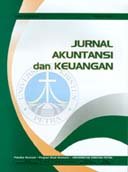Analysing the Potential of Blockchain for the Accounting Field in Indonesia
 :
:
https://doi.org/10.9744/jak.23.2.51-61
Keywords:
Blockchain technology, accounting information system, triple-entry accountingAbstract
This research aims to identify and analyze the potential of blockchain technology for the accounting field in Indonesia. This research was conducted at the Indonesian Blockchain Association. This research uses qualitative methods with the case study approach and analysis of making explanation strategies. The result of this study indicates that blockchain is applicable in Indonesia without having to use cryptocurrency as a payment tool. The result finds that blockchain can be used as a technology for Accounting Information System. One of the reasons is that all accounting transactions have the potential to be traceable with the blockchain. The data in this technology can be considered as relevant information due to the nature of blockchain as a technology that records and stores data that cannot be changed and manipulated. Blockchain will be used as a database and data procession will still be carried out by using the Accounting Information System. Blockchain is unable to automatically process data into information that may be needed in accounting. This research is expected to strengthen the theory related to blockchain as one of the accounting technologies, also to be an initial step in improving the concept of triple-entry accounting that is usable in Indonesia by using Blockchain which is supported by other platforms such as ERP and uses Token as the representative of assets or financial in recording transactions.
References
Andersen, N. (2016). Blockchain Technology A Game-Changer in Accounting?. Deloitte, 1–5. https://www2.deloitte.com/content/dam/Deloitte/de/Documents/Innovation/Blockchain_A%20game-changer%20in%20accounting.pdf
Cai, C. W. (2019). Triple‐entry Accounting with Blockchain: How Far Have We Come?. Accounting & Finance 1-23. doi: 10.1111/acfi.12556.
Coyne, J. G., and McMickle, P.L. (2017). Can Blockchains Serve an Accounting Purpose?. Journal of Emerging Technologies in Account¬ing 14(2):101–11. doi: 10.2308/jeta-51910.
Dai, J., and Vasarhelyi, M. A. (2017). Toward Blockchain-Based Accounting and Assurance. Journal of Information Systems, 31(3):5–21. doi: 10.2308/isys-51804.
Franedya, R. (2018). OJK: Teknologi Block¬chain Penting Untuk Ekonomi Digital. Retrieved November 8, 2019. https://www.cnbcin-donesia.com/tech/20180715152756-37-23615/ ojk-teknologi-blockchain-penting-untuk-ekonomi-digital.
Gamar, R. (2019). Lewat Tokoin, UMKM Bisa Mengembangkan Usaha Berbasis Teknologi Digital. Retrieved November 8, 2019 https://regional.kompas.com/read/2019/03/05/11532301/lewat-Tokoin-umkm-%09bisa-mengembangkan-usaha-berbasis-teknologi-digital.
George, R. P., Peterson, B. L., Yaros, O., Beam, D. L., Dibbell, J. M., & Moore, R. C. (2019). Blockchain for business. Journal of Investment Compliance, 20(1), 17–21. https://doi.org/10. 1108/joic-01-2019-0001
Ibañez, J. I., Bayer, C. N., Tasca, P., & Xu, J. (2020). REA, triple-entry accounting and blockchain: Converging paths to shared ledger systems. ArXiv, 1–56. https://doi.org/10.2139/ ssrn.3602207
Indopos.co.id. (2018). Teknologi Blockchain Berikan Banyak Manfaat untuk Sektor Akun-tansi. Retrieved November 8, 2019. https://in-dopos.co.id/read/2018/05/05/136991/teknologi-blockchain-berikan-banyak-manfaat-untuk-sektor-akuntansi/
Marina, A., Wahjono, S. I., Syaban, M., & Suarni, A. (2017). Sistem informasi akuntansi: Teori dan Partikal. Surabya: UMSurabaya Publishing.
Nakamoto, S. (2008). Bitcoin: A Peer-to-Peer Electronic Cash System | Satoshi Nakamoto Institute. In 2008-10-31.
Nuraliati, A., & Azwari, P. C. (2019). Akuntansi Untuk Cryptocurrency. I-Finance: A Research Journal on Islamic Finance, 4(2), 131–142. https://doi.org/10.19109/ifinance.v4i2.2885
Onlinepajak. (2018). Blockchain dan Peman-faatannya di Indonesia. Retrieved November 8, 2019. https://www.online-pajak.com/blockchain.
Rossiana, G. (2018). BI Pelajari Blockchain untuk Sistem Pembayaran Indonesia. Retriev¬ed November 8, 2019. https://www.cnbcindo-nesia.com/tech/20180410135854-37-10389/bi-pelajari-blockchain-untuk-sistem-pembayaran-indonesia
Sadiku, M. N. O., Eze, K. G., & Musa, S. M. (2018). Smart Contracts : A Primer. Journal of Scientific and Engineering Research, 5(5), 538–541. https://www.researchgate.net/publication/ 326752872_Smart_Contracts_A_Primer
Simoyama, F. D. O., Grigg, I., Bueno, R. L. P., and Oliveira, L. C. D. (2017.) Triple Entry Ledgers with Blockchain for Auditing. International Journal of Auditing Technology, 3(3):163. doi: 10.1504/ijaudit.2017.10007789.
Suryani, A. W., and Helianti, U., (2020.) Rigour in Qualitative Studies: Are We on Track?, Jurnal Akuntansi Dan Keuangan, 22(2):47–58.
Swan, M. (2015). Blockchain for a New Economy. Sebastopol: O’Reilly Media. https://epdf. pub/download/blockchain-blueprint-for-a-new-economy.html
Syarizka, D. (2019). Apa Manfaat Blockchain bagi UMKM?. Retrieved November 8, 2019. https://teknologi.bisnis.com/read/20190730/84/1130223/apa-manfaat-blockchain-bagi-umkm
Tan, B. S., & Low, K. Y. (2019). Blockchain as the Database Engine in the Accounting System. Australian Accounting Review, 29(2), 312–318. https://doi.org/10.1111/auar.12278
Trigo, A., Belfo, F., & Estébanez, R. P. (2016). Accounting Information Systems: Evolving towards a Business Process Oriented Accounting. Procedia Computer Science, 100, 987–994.
Wang, H., Chen, K., & Xu, D. (2016). A maturity model for blockchain adoption. Financial Innovation, 2(1), 12.
Yin, R. K. (2018). Studi Kasus: Desain dan Metode. Depok: Rajawali Pers. Metode. Depok: Rajawali Pers.
Downloads
Published
How to Cite
Issue
Section
License
Authors who publish with this journal agree to the following terms:
- Authors retain the copyright and publishing right, and grant the journal right of first publication with the work simultaneously licensed under a Creative Commons Attribution License that allows others to share the work with an acknowledgement of the work's authorship and initial publication in this journal.
- Authors are able to enter into separate, additional contractual arrangements for the non-exclusive distribution of the journal's published version of the work (e.g., post it to an institutional repository or publish it in a book), with an acknowledgement of its initial publication in this journal.
- Authors are permitted and encouraged to post their work online (e.g., in institutional repositories or on their website) followingthe publication of the article, as it can lead to productive exchanges, as well as earlier and greater citation of published work (See The Effect of Open Access).<a href="http://creativecommons.org/lice














